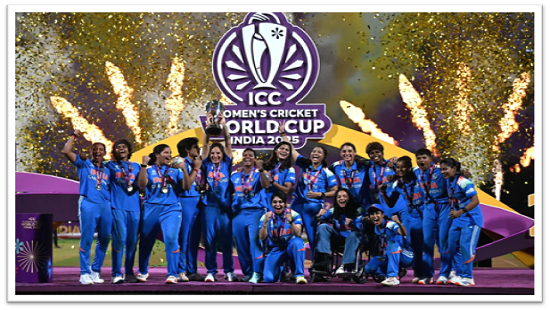
Maharashtra Govt Announced 2.25 Crore Reward for Mandhana, Jemimah & Radha Yadav, Sparks a New Era in Indian Sports Equality
When India’s women’s cricket team lifted the ICC Women’s World Cup trophy in Navi Mumbai, the celebration went far beyond the boundaries of the pitch. It was a national moment of pride, a signal that women’s sports in India are no longer on the sidelines, but firmly at the center of the country’s sporting narrative.
Adding weight to that moment, the Maharashtra government announced a cash reward of ₹2.25 crore each for Smriti Mandhana, Jemimah Rodrigues, and Radha Yadav, and ₹22.5 lakh for their coach, Amol Muzumdar. The gesture, though guided by existing sports policy, represents something larger, a public acknowledgment that women’s sporting excellence deserves equal recognition, visibility, and respect.
A Reward That Redefines Recognition
The decision, passed unanimously during a Cabinet meeting led by Chief Minister Devendra Fadnavis, with Deputy Chief Ministers Eknath Shinde and Ajit Pawar in agreement, reflects a rare political consensus, one that transcends party lines in Favor of progress. Maharashtra’s sports policy already guarantees ₹2.25 crore for any world title victory, but this decision’s significance lies in its application: equal reward for equal achievement.
By honouring the women cricketers in the same bracket as men, the state has done more than distribute prizes. It has set a benchmark for equity, treating women’s sports not as an exception, but as an integral part of India’s athletic identity.
Why It Matters in the Bigger Picture
According to the BCCI, viewership for women’s cricket has surged nearly 350% since 2017, while sponsorship deals for the Women’s Premier League (WPL) have crossed ₹950 crore. Yet, the acknowledgment from government institutions has often lagged behind public enthusiasm. Maharashtra’s move corrects that imbalance.
This recognition carries social, cultural, and economic weight. It validates years of quiet dedication from athletes who have had to fight for facilities, visibility, and fairness. For millions of young girls across India, it serves as a message: your dreams on the field are not secondary, they are celebrated.
The Economics of Recognition
Sport is a growing economic engine. India’s sports industry, valued at over ₹16,000 crore in 2024, is still heavily skewed toward men’s cricket, which captures nearly 85% of sponsorship spending. Women’s sports occupy a modest share of less than 10%, reflecting the deep-rooted inequities that persist.
Maharashtra’s decision has the potential to alter this imbalance. A clear, gender-neutral reward structure sends a strong signal to investors, brands, and policymakers. It redefines sporting recognition as a professional standard rather than a goodwill gesture. This shift, though subtle, could help redirect sponsorship flows, increase women’s sports coverage, and strengthen India’s sports economy from the ground up.
Recognition Beyond the Scoreboar
Equally commendable is the acknowledgment of coach Amol Muzumdar with a ₹22.5 lakh reward. A stalwart of Mumbai cricket, Muzumdar represents the often-unseen force behind success, the mentors who turn potential into performance. By recognizing his role, the state emphasizes that behind every athlete’s triumph lies a system of preparation, discipline, and support.
This alignment between policy and recognition is vital. Too often, achievements are celebrated briefly and forgotten quickly. Institutionalized rewards like these build continuity, ensuring that success stories feed into a cycle of inspiration and aspiration.
India’s Defining Victory
India’s 52-run win against South Africa in the final at DY Patil Stadium was more than just another sporting achievement. It was symbolic of resilience and transformation. Shafali Verma’s electrifying 87, Deepti Sharma’s composed 58, and her game-winning bowling performance captured not only a trophy but the nation’s imagination. Deepti’s “Player of the Tournament” award underscored a generation of athletes who blend flair with discipline, a combination that’s fast defining modern Indian sport.
When former legends Mithali Raj and Jhulan Goswami joined the celebrations, it was a moment of poetic continuity, the torch being passed from pioneers to pathbreakers. The Maharashtra government’s recognition amplifies that emotion, turning victory into a legacy.
Building a Lasting Sports Legacy
The Indian women’s team is set to meet Prime Minister Narendra Modi in New Delhi before returning to Mumbai for a grand felicitation. But beyond the ceremony lies the real opportunity, to turn symbolic gestures into sustainable systems. Maharashtra now has a chance to go further, by investing in training facilities, district-level academies, and scholarship programs for young girls.
If replicated nationwide, such policy consistency could redefine India’s sports landscape. It could push the nation closer to gender parity in not just recognition but opportunity, the ultimate goal of any progressive sports ecosystem.
A New Chapter for Indian Sports
Maharashtra’s ₹2.25 crore announcement is not just about money, it’s about momentum. It represents a decisive break from tokenism and a step toward structural equality in Indian sports.
By rewarding its women champions with the same dignity as any global athlete, the state has reframed what progress looks like, not in speeches, but in action. It’s a bold statement that says: when our women win for India, India must stand up and applaud, equally, proudly, and permanently.




